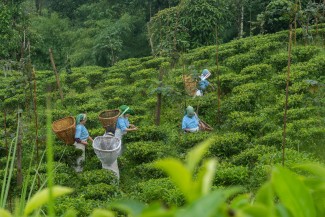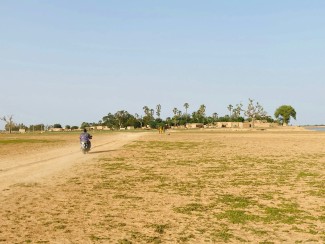Traditionally, shea butter in West Africa is produced by women. They collect shea nuts, boil and dry them in the sun, roast them, then pound and grind them into a paste. That paste is mixed with water and churned into an ivory, creamy butter.
Trade in shea nuts and shea butter, which provides a host of skin benefits and is also used in chocolates, is now a multimillion-dollar industry. And most shea, whether raw or processed as butter, comes from West Africa, specifically Burkina Faso, Benin, Ghana and Mali.
Burkina Faso is the world's largest exporter of shea nuts, with an estimated global market share of around 50%. It is also in the least developed country (LDC) category, as are Benin and Mali, indicating the low per capita income and vulnerabilities to shocks.
Could a move to exports of organic shea be one way to create more income security?
The Global Shea Alliance (GSA) works to promote shea and create a competitive and sustainable shea industry, and has been seeing a steady rise in demand for organic shea driven by consumer trends.
Locals can get three to four times more for organic shea than non-organic, which makes a big difference for people working in the sector with few other opportunities for income.
According to the GSA, a multi-stakeholder platform of governments, the private sector, non-governmental organizations, civil society organizations, researchers and women’s shea producer associations, “Companies are looking to expand their portfolios to cater to this consumer demand.”
Signaling the increasing trend and potentially where the market is headed, a number of major agri-traders have recently announced they are expanding their organic portfolios.
But this also means that the smaller stakeholders – the shea cooperatives, suppliers and producers – would need to get certified.
And cooperatives do want such certification, in order to expand their offerings and their market share, according to the GSA.
There are a number of obstacles for those aiming for organic certification, including the cost, proper training to ensure adherence to standards, and the ability to maintain those standards over time.
Money and training is something most West African shea producers, which are usually small-scale cooperatives, don’t have a lot of.
Some GSA members are working toward organic certification by Ecocert, which has offices in Burkina Faso and offers international certification.
************************
Case Study
Karibel is a Burkina Faso enterprise that produces both traditional and organic shea butter. They had organic certification through Ecocert that the company obtained in 2006, and now work with the Belgium-based Certifisys. The company produces about 20 tonnes of shea butter per month that goes mostly to Germany.
“To produce organic butter, the site where we produce the butter is certified, and we also buy the nuts from associations that are certified. They bring the kernels by truck to Ouagadougou to the production site,” said Karibel Director Ouadraogo Aissata.
Organic certification spans the shea nut journey from tree to processing site to market. In shea forests, chemical fertilizers and pesticides are banned. Processing sites must be clean and free of pests. Labelling must be clear and properly noted.
“If all the conditions are met, you get the certificate, and every year there are unannounced visits. You also have to pay invoices to get the certificates,” said Aissata.
But the impact on Karibel has been great, as they have access to new markets and new organic-seeking customers, she said.
**************************
What is needed to go organic
Organic standards are stringent, and many. For the thousands of small shea cooperatives that dot the West African landscape, understanding the many rules is one hurdle.
There is added complexity as there are a number of certifications out there, including the USDA organic certification, the European Union certification, the NASSA, the Australian.
With demand for organic shea increasing, one way to help augment incomes in this female-dominated field would be through targeted support to guide shea associations in the process. This would include trainings to explain the requirements, and support to define export markets and navigate what certifications are necessary.
Funding for associations to pay for certification would be another important method of support.
According to the GSA, it is hard on the women in the shea industry to keep up to date on things like changing requirements. With this in mind, support to keep associations informed and aware could also facilitate more organic certifications, and therefore that more shea makes it to more – and different – markets.
If you would like to reuse any material published here, please let us know by sending an email to EIF Communications: eifcommunications@wto.org.



